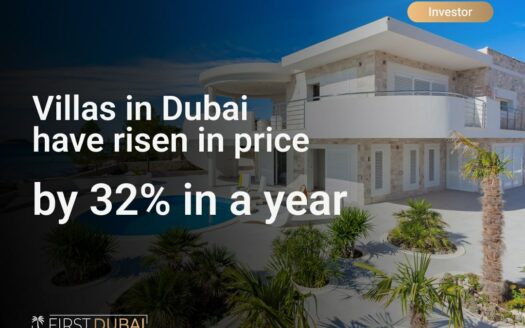Is it too late to invest in Dubai or not?
Dubai is a rapidly developing city that appeals to foreign investors because of its stable economy, zero taxation, high level of safety, and standard of living. However, investing in Dubai does not guarantee profit. Like any other region, it has its own characteristics, risks, and opportunities that must be considered when making a decision.
Investing in Dubai’s real estate market is a popular and affordable option. The market offers a variety of properties in terms of type, size, price, and location, including apartments, villas, townhouses, offices, warehouses, and hotel rooms. Renting out your property can also provide passive income, with an average yield of 6-8% per annum. Additionally, you can anticipate an increase in your property’s value over time, particularly if it is situated in a developing area or possesses distinctive features.
Let us examine the primary factors that could impact the real estate market in Dubai and the UAE in the coming years:
In June-July 2023, a corporate tax of 9% on company profits will be introduced. This may lead to an increase in prices for building materials, construction services, and other industries such as mechanical engineering and cargo transportation. As a result, the cost of construction in the UAE will significantly increase in the near future.
Additionally, Dubai has a large population of British and EU citizens, many of whom own real estate properties. Why is the number of Europeans in Dubai constantly increasing despite the decreasing European index of profitability from rental properties? In recent years, real estate in Europe has become cheaper, and the percentage of rental yield is already around 3% per annum, and even less in the British Isles. As a result, more and more Europeans are opting to purchase real estate in Dubai, where they can enjoy a rental yield of 6-8% per annum. Additionally, the surge in demand over the past decade has resulted in a rise in property prices of over 15% per year.
India, with a population of approximately 1.4 billion people, boasts a rapidly growing economy fueled by abundant labor, resources, and a burgeoning entrepreneurial class. Furthermore, India is conveniently located just a three-hour flight from Dubai. Numerous affluent Indian entrepreneurs and high-level executives are investing in Dubai and registering their businesses in the region. This investment is creating new job opportunities and, consequently, driving demand for real estate.
The pandemic caused a global lockdown and had a significant impact on China. Recently, China began lifting Covid restrictions, and many Chinese investors resumed their business trips. The UAE is one of the most important destinations for them, and Dubai has always been a city where the Chinese have invested. Under the laws of the People’s Republic of China, the ownership period of real estate is limited to 70 years, and the right of ownership is not inheritable. This means that real estate ownership is restricted to a certain period of time, which may not be satisfactory to some. Therefore, Chinese citizens are investing in other countries. One popular destination is the UAE, with most investments going to Dubai. After the lifting of restrictions, Chinese investors are expected to resume their active demand.
The UAE has no income or real estate tax, and there are no taxes on rental income or property ownership.
The status of real estate in Dubai is FreeHold, which allows foreigners to own property without any time limitations and with legal protection. Foreigners also have the right to inherit real estate in the UAE.
Factors that may contribute to growth in the coming months and years include the introduction of corporate tax and the European real estate crisis.
The UAE has experienced Indian influence and development, as well as renewed demand from China.
Additionally, the UAE benefits from its tax system and legislation.




